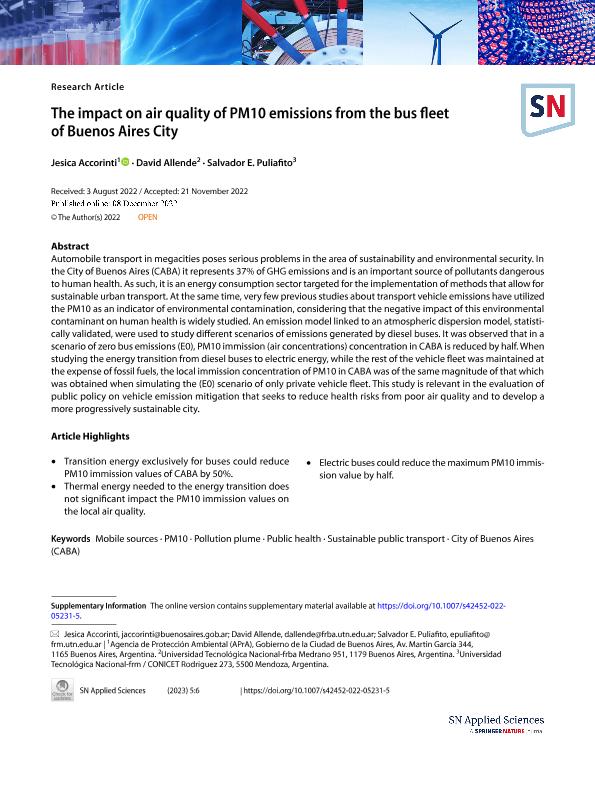Mostrar el registro sencillo del ítem
dc.contributor.author
Accorinti, Jesica
dc.contributor.author
Allende, David Gabriel

dc.contributor.author
Puliafito, Salvador Enrique

dc.date.available
2023-11-30T14:07:13Z
dc.date.issued
2023-01
dc.identifier.citation
Accorinti, Jesica; Allende, David Gabriel; Puliafito, Salvador Enrique; The impact on air quality of PM10 emissions from the bus fleet of Buenos Aires City; Springer Nature; SN Applied Sciences; 5; 1; 1-2023; 1-11
dc.identifier.uri
http://hdl.handle.net/11336/218898
dc.description.abstract
Automobile transport in megacities poses serious problems in the area of sustainability and environmental security. In the City of Buenos Aires (CABA) it represents 37% of GHG emissions and is an important source of pollutants dangerous to human health. As such, it is an energy consumption sector targeted for the implementation of methods that allow for sustainable urban transport. At the same time, very few previous studies about transport vehicle emissions have utilized the PM10 as an indicator of environmental contamination, considering that the negative impact of this environmental contaminant on human health is widely studied. An emission model linked to an atmospheric dispersion model, statistically validated, were used to study different scenarios of emissions generated by diesel buses. It was observed that in a scenario of zero bus emissions (E0), PM10 immission (air concentrations) concentration in CABA is reduced by half. When studying the energy transition from diesel buses to electric energy, while the rest of the vehicle fleet was maintained at the expense of fossil fuels, the local immission concentration of PM10 in CABA was of the same magnitude of that which was obtained when simulating the (E0) scenario of only private vehicle fleet. This study is relevant in the evaluation of public policy on vehicle emission mitigation that seeks to reduce health risks from poor air quality and to develop a more progressively sustainable city. Article Highlights: Transition energy exclusively for buses could reduce PM10 immission values of CABA by 50%.Thermal energy needed to the energy transition does not significant impact the PM10 immission values on the local air quality.Electric buses could reduce the maximum PM10 immission value by half.
dc.format
application/pdf
dc.language.iso
eng
dc.publisher
Springer Nature
dc.rights
info:eu-repo/semantics/openAccess
dc.rights.uri
https://creativecommons.org/licenses/by/2.5/ar/
dc.subject
CITY OF BUENOS AIRES (CABA)
dc.subject
MOBILE SOURCES
dc.subject
PM10
dc.subject
POLLUTION PLUME
dc.subject
PUBLIC HEALTH
dc.subject
SUSTAINABLE PUBLIC TRANSPORT
dc.subject.classification
Meteorología y Ciencias Atmosféricas

dc.subject.classification
Ciencias de la Tierra y relacionadas con el Medio Ambiente

dc.subject.classification
CIENCIAS NATURALES Y EXACTAS

dc.title
The impact on air quality of PM10 emissions from the bus fleet of Buenos Aires City
dc.type
info:eu-repo/semantics/article
dc.type
info:ar-repo/semantics/artículo
dc.type
info:eu-repo/semantics/publishedVersion
dc.date.updated
2023-11-29T13:23:19Z
dc.identifier.eissn
2523-3971
dc.journal.volume
5
dc.journal.number
1
dc.journal.pagination
1-11
dc.journal.pais
Suiza

dc.description.fil
Fil: Accorinti, Jesica. Agencia de Protección Ambiental; Argentina
dc.description.fil
Fil: Allende, David Gabriel. Universidad Tecnológica Nacional; Argentina. Consejo Nacional de Investigaciones Científicas y Técnicas. Centro Científico Tecnológico Conicet - Mendoza; Argentina
dc.description.fil
Fil: Puliafito, Salvador Enrique. Consejo Nacional de Investigaciones Científicas y Técnicas. Centro Científico Tecnológico Conicet - Mendoza; Argentina. Universidad Tecnológica Nacional; Argentina
dc.journal.title
SN Applied Sciences
dc.relation.alternativeid
info:eu-repo/semantics/altIdentifier/doi/http://dx.doi.org/10.1007/s42452-022-05231-5
dc.relation.alternativeid
info:eu-repo/semantics/altIdentifier/url/https://link.springer.com/article/10.1007/s42452-022-05231-5
Archivos asociados
